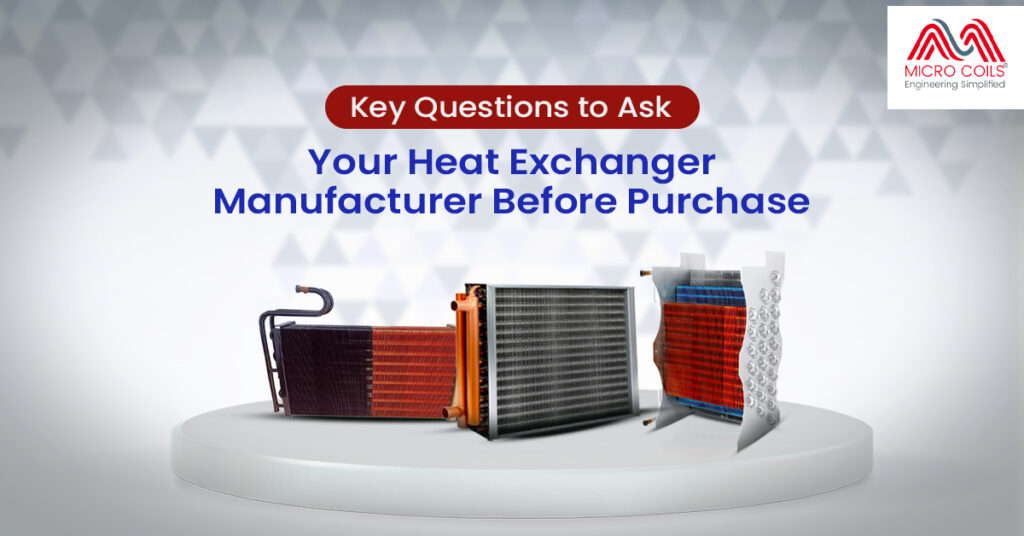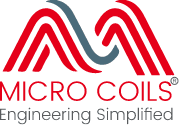
Selecting the right heat exchanger for your industrial operation is a critical business decision that impacts everything from operational efficiency to your bottom line. With countless heat exchanger manufacturers in the market, each promising superior performance and value, how do you cut through the noise and find the right partner for your thermal management needs?
The key lies in asking the right questions before you commit. Smart procurement teams know that a thorough evaluation process upfront prevents costly mistakes, unexpected downtime, and budget overruns later. Whether you’re sourcing equipment for a new facility, planning a maintenance shutdown, or upgrading aging systems such as evaporators and condensers, the questions you ask today will determine your satisfaction with the purchase for years to come.
This guide walks you through the essential questions that will help you evaluate potential suppliers, compare options effectively, and ultimately choose a heat exchanger manufacturer that delivers both quality equipment and reliable partnership.
Your Manufacturer’s Experience and Expertise
The first question you should ask any potential supplier is about their experience in your specific industry. Not all heat exchangers are created equal, and what works perfectly in a pharmaceutical plant might be completely unsuitable for a chemical processing facility.
Ask your manufacturer: “How long have you been designing heat exchangers for my industry?” A seasoned heat exchanger manufacturer in India or elsewhere should be able to provide case studies, references, and specific examples of similar applications they’ve handled successfully.
Don’t just settle for general experience either. Dig deeper into their technical expertise. Can they handle the specific temperatures, pressures, and corrosive materials your process requires? Do they understand the unique challenges of your industry’s regulatory requirements?
Quality Standards and Certifications
Quality is non-negotiable when it comes to heat exchangers, ac cooling coils, or refrigeration coils. Equipment failure can shut down entire production lines, create safety hazards, and result in expensive emergency repairs.
Ask about certifications and quality standards. Does the manufacturer follow ISO standards? Are they ASME certified? What quality control processes do they have in place during manufacturing? A reputable manufacturer should be proud to share their certifications and quality procedures.
Also inquire about their testing protocols. How do they ensure each unit meets specifications before it leaves their facility? Pressure testing, leak detection, and performance verification should all be standard practices.
Customization Capabilities
Every industrial application is unique, and your heat exchanger should be too. Off-the-shelf solutions might seem cheaper initially, but they often fall short when it comes to optimal performance for your specific needs.
Ask about customization options. Can they modify designs to accommodate space constraints in your facility? Are they able to work with exotic materials if your process requires them? How flexible are they when it comes to connection sizes, orientations, and mounting options?
The best manufacturers view each project as a partnership, working closely with you to optimize the design for your exact requirements rather than trying to force-fit a standard product into your application.
Material Selection and Durability
The materials used in your heat exchanger will directly impact its lifespan, performance, and maintenance requirements. Different applications call for different materials – from standard carbon steel to exotic alloys like Hastelloy or titanium.
Discuss the pros and cons of different material options for your application. What does the manufacturer recommend and why? How do different materials affect cost, longevity, and performance? Understanding these trade-offs will help you make the best long-term investment.
Don’t forget to ask about corrosion resistance, especially if you’re dealing with aggressive chemicals or high-temperature applications. The right material selection upfront can prevent costly premature failures later.
Performance Guarantees and Testing
Any reputable manufacturer should stand behind their products with solid performance guarantees. Ask about heat transfer rates, pressure drop specifications, and efficiency ratings. More importantly, ask how these specifications are verified.
Will they provide performance testing data? Can they guarantee that the unit will meet your specified duty requirements? What happens if the heat exchanger doesn’t perform as promised? Clear performance guarantees protect your investment and give you recourse if things don’t go as planned.
Installation and Startup Support
Even the best-designed heat exchanger can underperform if it’s not installed and commissioned properly. Ask what kind of installation support the manufacturer provides. Do they offer on-site supervision? Will they help with startup and commissioning?
Some manufacturers provide detailed installation manuals and remote support, while others offer comprehensive on-site services. Understanding what’s included – and what costs extra – helps you budget appropriately and ensures a smooth installation process.
Maintenance and Service Support
Heat exchangers require regular maintenance to perform optimally, and eventually, they’ll need repairs or refurbishment. Before making a purchase, understand what kind of ongoing support you can expect.
Does the manufacturer offer maintenance services? Are spare parts readily available? What’s their typical response time for service calls? How long do they guarantee parts availability? These factors become crucial when you need to minimize downtime and keep your operations running smoothly.
Lead Times and Delivery
Time is the real leader in any business. Ask about realistic lead times for both standard and custom units. What factors might affect delivery schedules? Do they have an inventory of common sizes, or is everything made to order?
Understanding lead times helps you plan maintenance shutdowns, new installations, and equipment replacements more effectively. It also helps you evaluate whether a manufacturer can meet your project timeline requirements.
Cooling Solutions Integration
Modern industrial facilities often require comprehensive cooling solutions rather than just individual heat exchangers. Ask whether the manufacturer can provide integrated cooling systems, including pumps, fans, controls, and monitoring equipment.
A manufacturer who can provide complete cooling solutions often offers better system optimization, simplified project management, and single-point accountability for performance. This can be particularly valuable for complex installations or when upgrading entire cooling systems.
Pricing and Value Proposition
While price is certainly important, it shouldn’t be the only factor in your decision. Ask for detailed quotes that break down costs for equipment, installation support, training, and ongoing service. This helps you compare total cost of ownership rather than just upfront purchase price.
Consider the value proposition beyond just the initial cost. A slightly more expensive heat exchanger that lasts longer, operates more efficiently, or requires less maintenance often proves to be the better investment over time.
Making Your Final Decision
Choosing the right heat exchanger manufacturer is about finding a partner who understands your needs, provides quality products, and offers reliable support throughout the equipment lifecycle. Take time to ask these key questions, compare responses from multiple manufacturers, and check references from other customers in your industry.
Remember, the cheapest option isn’t always the best value, and the most expensive isn’t necessarily the highest quality. Focus on finding a manufacturer who demonstrates expertise in your application, maintains high quality standards, and offers the support you need for long-term success.
By asking the right questions upfront, you’ll be well-positioned to make an informed decision that serves your operation well for years to come.
Understanding warranty terms is crucial for protecting your investment. Ask for specific details about warranty duration, what components are covered, and what conditions might void the warranty. Some manufacturers offer comprehensive warranties covering both parts and labor, while others may only cover manufacturing defects. Clarify whether warranty coverage includes on-site repairs or if you’ll need to ship the unit back to the manufacturer. Also ask about warranty extensions and what documentation you’ll need to maintain to keep the warranty valid.
Energy costs can represent a significant portion of your operating expenses, making efficiency a key consideration. Request detailed calculations showing how their heat exchanger will perform in your specific application, including expected energy consumption, potential utility savings, and payback period. A good manufacturer should be able to compare their solution against your current equipment or alternative options, providing concrete numbers on efficiency improvements and long-term cost benefits.
Industrial processes evolve, and your heat exchanger should be able to adapt when possible. Ask about the flexibility of their designs for future modifications or upgrades. Can the unit handle increased capacity if your production grows? Are there options for retrofitting different internals if your process chemistry changes? Understanding these limitations upfront helps you avoid costly replacements when your needs evolve and ensures your equipment investment remains viable longer.
When working with custom heat exchanger designs, your process information and specifications may contain sensitive business data. Ask about their confidentiality agreements, how they protect your proprietary information, and who owns the intellectual property rights to custom designs. Clarify whether they can sell similar designs to your competitors and what measures they take to protect your trade secrets throughout the design and manufacturing process.
Equipment failures don’t follow convenient schedules, and sometimes you need a replacement heat exchanger immediately to avoid extended downtime. Ask about their capabilities for emergency manufacturing and expedited delivery. Do they maintain inventory of common components that could speed up custom builds? What’s their fastest possible turnaround time, and what additional costs are involved? Understanding these capabilities helps you plan for contingencies and evaluate their ability to support your operations when urgent situations arise.



